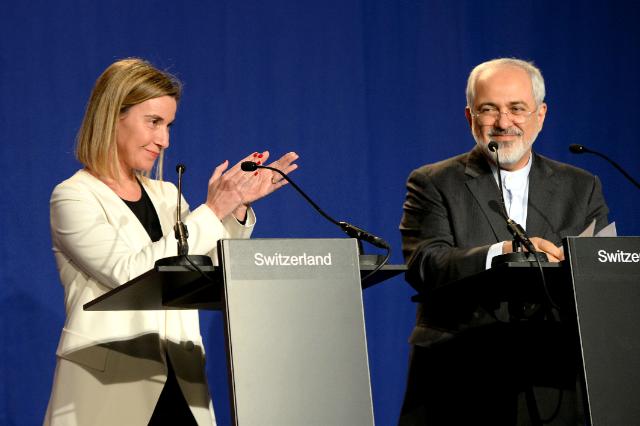The P5+1–Iran Deal

Thomas O'Donnell
Hertie School of Governance
Thomas O’Donnell was a DAAD/AICGS Research Fellow in April and May 2015. He is an academic, analyst, and consultant with expertise in the global energy system and international relations. At AICGS, his focus is “U.S. Expert Perspectives on German Energy Vulnerabilities.” Dr. O’Donnell’s teaching and research have encompassed the EU and Russia, Latin America, the Middle East, China, and the USA. His PhD is in nuclear physics from The University of Michigan at Ann Arbor; for the past 15 years he has primarily taught post-graduate international relations and development with a focus on energy and natural resource issues, including at The University of Michigan, The Ohio State University, at The New School University’s JJ Studley Graduate Program in International Affairs (NYC), and at Freie Universität’s JFK Institute (Berlin). At his blog, the GlobalBarrel.com, he follows issues of energy and international affairs, and he also writes frequently for the IP Journal (Berlin), Americas Quarterly (NYC), and Petroguía (Caracas).
Throughout 2008-09, Dr. O’Donnell was a U.S. Fulbright Scholar and Visiting Professor in Caracas at the Center for the Study of Development (CENDES) of the Central University of Venezuela (UCV). He is a Senior Analyst at Wikistrat and consults with various other geopolitical, business-intelligence, and advisory firms. Before doing his PhD, Dr. O’Donnell spent a decade working in U.S. industry, gaining technical experience in automobile manufacturing, railway operations, large-scale HVAC, and in power generation. He has also worked as a radiation safety and health-physics officer at a research nuclear reactor and in medical and other settings. In experimental nuclear physics, he conducted basic research at several particle-accelerator and national laboratory facilities in the U.S., Japan, and elsewhere; and is author or co-author on about 40 peer-reviewed scientific papers. Since 2012, he has lived in Berlin with his wife and youngest children. He speaks English, Spanish, and functional German.

On April 3, the High Representative of the European Union for Foreign Affairs, Federica Mogherini, together with Iran’s Foreign Minister Mohammad Javad Zarif announced a framework agreement significantly limiting Iran’s future nuclear program.
Clearly, this deal was only possible with the patient collaboration of the British, French, German, and EU foreign ministers and U.S. secretaries of state. However, this common front was only forged through a multiple-step process orchestrated by Mr. Obama, beginning when he took office.
Before coming into office in 2008, Obama had declared “My whole goal in terms of having tough, serious direct diplomacy […] is because if we show ourselves willing to talk and to offer carrots and sticks […] and if Iran then rejects any overtures of that sort, it puts us in a stronger position to mobilize the international community to ratchet up the pressure on Iran.” That is, his initial offer of unconditional talks with Iran were as much aimed at bringing the Europeans, and others, on board as convincing the Iranians that his administration really wanted a peaceful resolution.
Back then, Berlin, Paris, and London were pessimistic and unenthusiastic about further efforts to press Iran on its nuclear program. Eight years of disastrous U.S. policies in the Gulf under George W. Bush had taken their toll. The Europeans saw Bush as having pressed unnecessarily harsh demands against Iran, making real progress impossible.
In particular, Bush’s rejection of an Iranian offer in 2003 for a “Grand Bargain” to settle its nuclear program and other long-term points of contention in the region is seen by many experts as responsible for Tehran’s decision to invigorate what had—until then—been a meager nuclear program initiated by the Shah. Tehran saw an expanded program as a necessary bargaining chip when confronting a Washington which, under Bush, seemed to only want forcible regime change.
The Obama administration, in contrast, initiated low-key unconditional discussions. However, the brutal suppression of the Iranian opposition protesting electoral irregularities after Ahmadinejad’s June 2009 reelection scuttled these talks. Obama, as he had previously warned, then moved to impose “crippling” sanctions, until the Iranian side had to enter genuine negotiations. The harsh nature of the mullahs’ regime in suppressing the opposition also worked in Obama’s favor in diplomacy with Berlin, Paris, and London. As a senior U.S. Iran policy expert put it: “Without these provocations, I am personally skeptical that European governments would have agreed to adopt the measures that sacrificed their long-standing trade relationships with Tehran.”[1]
At the time, analysts and governments alike expressed little confidence Obama could succeed in bringing not only the Russians, Chinese, and Saudis onboard his harsh sanctions regime, but very skeptical EU-3 allies as well. Nevertheless, unlike under Bush, no one could say the administration did not make a good faith effort to negotiate, and it was clearly the Iranians who had walked away. A complex, global diplomatic full-court press followed—one too complex to recount here. Suffice it to say that the great bulk of U.S. diplomatic capital was invested during Obama’s first term in this single objective of global adherence to harsh sanctions on Iran; and the effort succeeded. And, during his second term, U.S. policy on issues such as Syria, according to what Obama himself has cited as U.S. “core interests,” were subordinated to optimizing success in negotiations with Iran.
The sanctions pressure on Iran was so intense as to trigger the Supreme Leader to permit the election of Hassan Rouhani as president on the promise to the Iranian people to negotiate a deal ending sanctions. Obama’s plan had not only forced the Iranians into serious negotiations; but, just as importantly for ultimate success, he had won the confidence of the European allies, instilling a new transatlantic optimism and common resolve that a negotiated settlement was possible.
Indeed, the spirit of transatlantic partnership on such matters has certainly evolved since 1996, during Bill Clinton’s administration, when Iranian “nuclear” sanctions were first imposed by vote of the U.S. Congress. These were denounced in Europe as “extraterritoriality,” and not unjustifiably; that had in fact been Clinton’s initial hesitation as well. In the opinion of Brookings Institute Senior Fellow, Suzanne Maloney, cited earlier, Clinton’s sanctions “[…] only prompted transatlantic tensions while doing little to erode European interest in the Iranian market.”[2] Some in Europe even threatened to take the matter to international tribunals. Only when the Iranian case went to the UN Security Council, from 2006, did such transatlantic tensions really begin to change. And, clearly, neither side had been solely responsible for the disunity and dysfunction. However, finally, it was the Obama administration that was willing to do what was really needed to create that unity. Perhaps there is a lesson here for the transatlantic partnership in confronting Russia’s recent aggressions under Putin.
[1] See http://www.brookings.edu/blogs/markaz/posts/2014/03/21-iran-sanctions-russia-crimea-nuclear
[2] See http://www.brookings.edu/blogs/markaz/posts/2014/03/21-iran-sanctions-russia-crimea-nuclear
Thomas O’Donnell is a DAAD/AGI Research Fellow in April and May 2015. He is an academic, analyst, and consultant with expertise in the global energy system and international relations.








